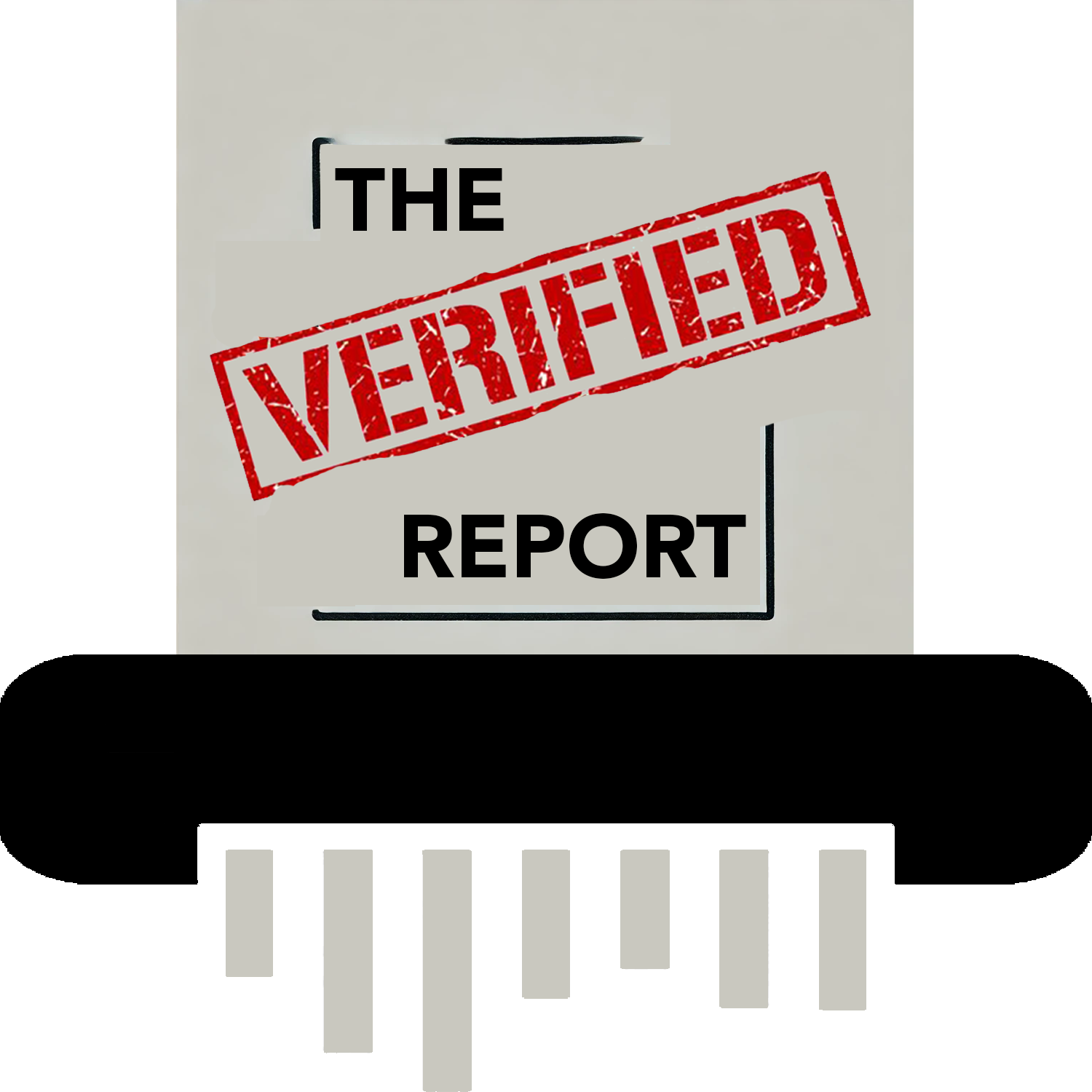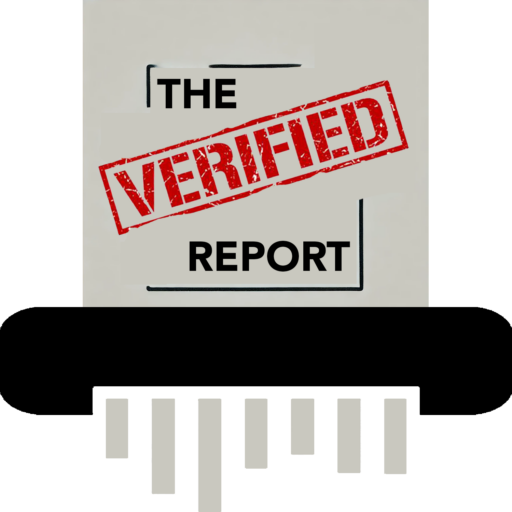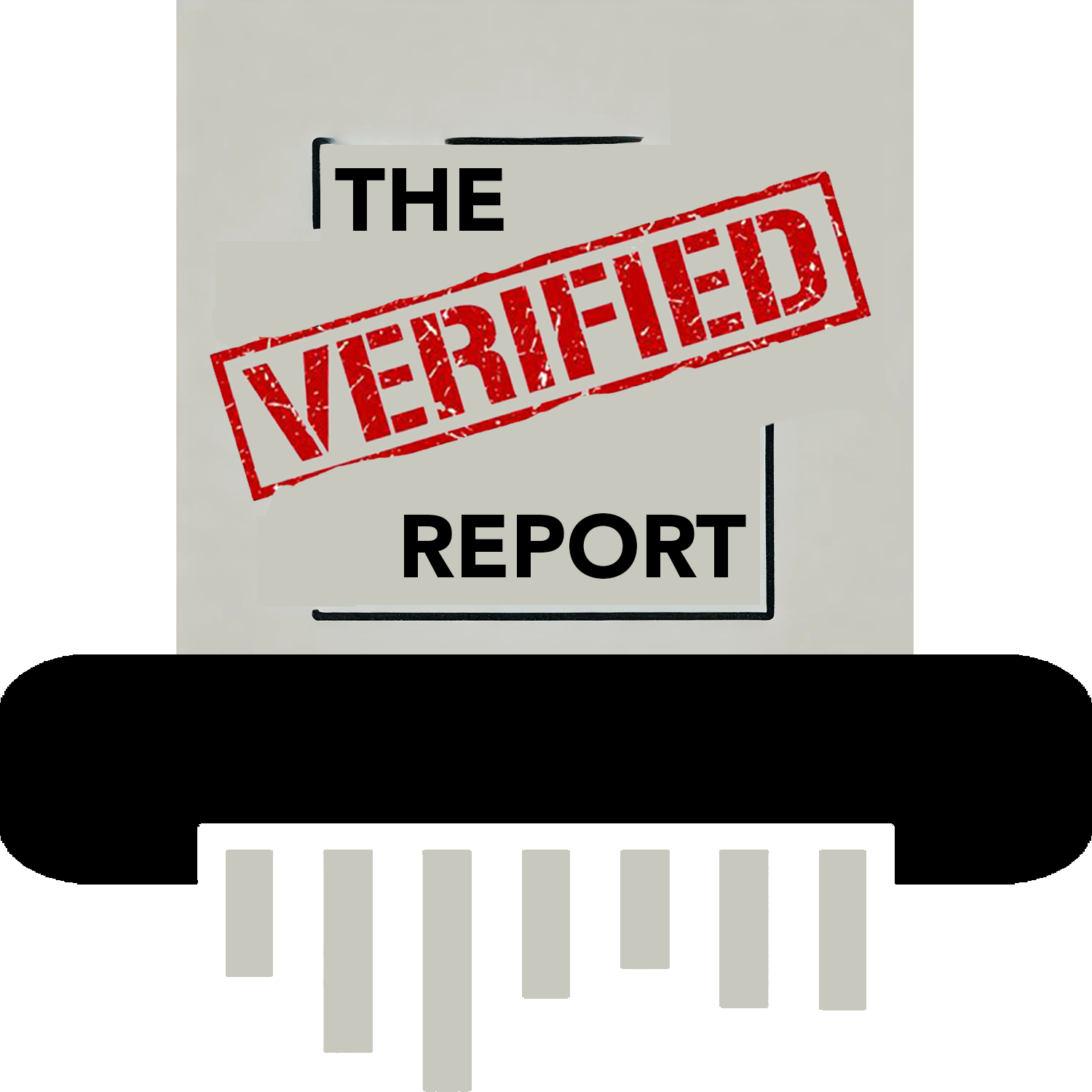Senator Chuck Schumer introduced legislation in 2023 and 2024 for the National Defense Authorization Act that would have created a task force to declassify an extensive cache of UAP documents. Called the UAPDA or the UAP Disclosure Act, this legislation also had an eminent domain clause that, if passed, would have given ownership of UFOs to the federal government, along with any biological evidence of aliens.
A highly modified version of the 2023 legislation was included in the 2024 NDAA (but it did not include the task force or the eminent domain clause.)
The full version of hte UAPDA was also not included in the 2025 NDAA version submitted by the Senate.
Here’s a comprehensive review of what the eminent domain clause would have entailed, if it had passed. (Please note that nothing in this article should be construed as legal advice of any form)
The Federal Government Could Claim Ownership of UFOs & Alien ‘Biological Evidence’
Schumer’s 64-page UAP bill for the 2024 NDAA (and the version submitted for the 2025 NDAA) had a lot of hidden details. A press statement noted that the bill was “modeled after JFK Assassination Records Collection Act.”
The press statement also pointed out:
“Additionally, the federal government shall have eminent domain over any and all recovered technologies of unknown origin (TUO) and biological evidence of non-human intelligence (NHI) that may be controlled by private persons or entities in the interests of the public good.”
If passed, not only would recovered UFO technology (referred to here as “technologies of unknown origin”) be automatically vested to the government, but so would “biological evidence” of aliens, aka non-human intelligence. (During Grusch’s interview with NewsNation in 2023, he was careful to refer to aliens as “non-human intelligence” and not extraterrestrials, citing that they might be interdimensional rather than extraterrestrial.)
Here’s what the bill itself said about eminent domain, starting in Section 10(a), called “Disclosure of Recovered Technologies of Unknown Origin and Biological Evidence of Non-Human Intelligence.” (The version submitted for the 2025 NDAA had identical verbiage.)
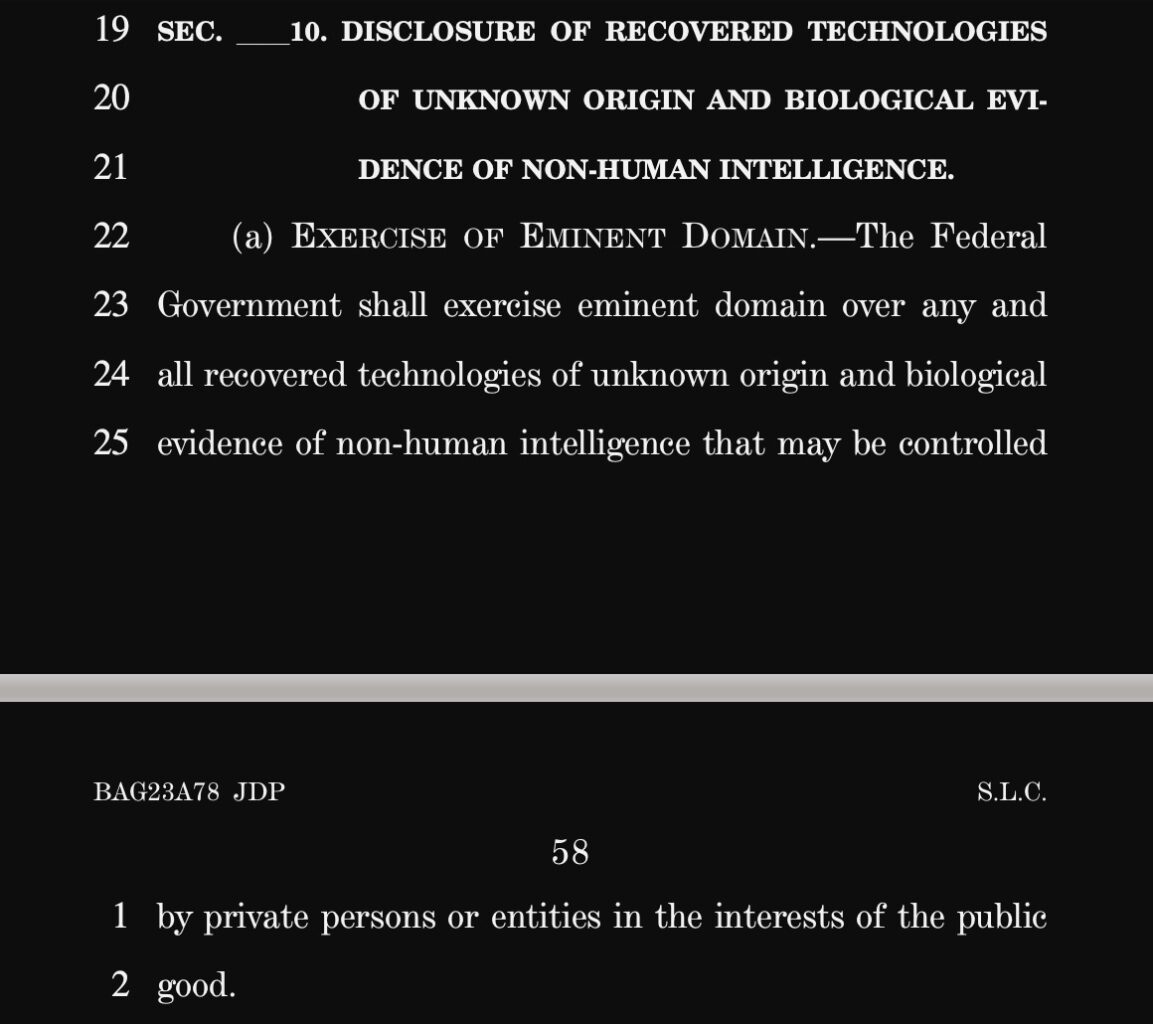
The bill read: “The Federal Government shall exercise eminent domain over any and all recovered technologies of unknown origin and biological evidence of non-human intelligence that may be controlled by private persons or entities in the interests of the public good.”
The way the law is worded, the government would get eminent domain over ALL biologics and recovered technologies owned by private persons or entities (i.e. any private companies, agencies, or individuals.) It states this is being done in the interest of the public good.
‘Public Use’ Is Likely Codified So It Falls Within the 5th Amendment
While some might thing the “public use” part of the eminent domain clause shows benevolence, it’s likely there to make it less likely to challenge via the Fifth Amendment.
The Fifth Amendment addresses eminent domain. It says, in part: “nor shall any person … be deprived of life, liberty, or property, without due process of law; nor shall private property be taken for public use, without just compensation.”
Essentially, as Cornell Law explains, this amendment gives the federal government a constitutional right to take private property for public use, as long as they pay “just compensation” to the private property holder. The Supreme Court has found this to be a payment of fair market value (the price a willing, unpressured buyer with full knowledge would pay.) But even this compensation has been limited via other Supreme Court rulings, where exceptions have been carved out leading the government to not need to compensate a property owner at all in some situations, Cornell Law notes.
Just what “public use” entails was extended in Kelo v. City of New London in 2005, when the Supreme Court held that the government could seize private property for private commercial development, if the development would publicly benefit an area that was “sufficiently distressed.” (Some states have laws that counteract this.)
Cornell Law explains that the private property the government can take isn’t just land. It includes tangible and intangible property, like (but not limited to) easements, personal property, contract rights and even trade secrets.
In other words, some might argue that the government already has the eminent domain right included in the UAPDA, as long as the taking is for “public use” or public benefit.
The wording of the UAPDA might be more about delineating that taking UFO tech and biologics is always “in the interests of the public good” (thus always allowable under the Fifth Amendment.) So it’s not so much establishing that eminent domain could happen, but simply making it a faster process by saying it would always be for the public good. (Just in my opinion.)
(Could a case be made that if the technology is seized and ultimately deemed not dislclosable to the public, then seizing it wasn’t for public benefit or use at all, and thus violated the Fifth Amendment? Possibly. But at the same time, the government might argue that national security requires keeping the technology secret, which also benefits the government…)
Eminent Domain Material Would Be Sent to the UAPDA’s Review Board
The bill goes on:
“(b) AVAILABILITY TO REVIEW BOARD.—Any and all such material, should it exist, shall be made available to the Review Board for personal examination and subsequent disclosure determination at a location suitable to the controlling authority of said material and in a timely manner conducive to the objectives of the Review Board in accordance with the requirements of this title.”
It appears that one reason for the eminent domain provision is to make it easier to access technology and send it to the Review Board. Private corporations can’t claim trade secrets to keep the technology or biological evidence from the transparency review board. (Of course, eminent domain could already be used on trade secrets, but that’s a different matter.)
The next section discusses what the Review Board should make note of when determining whether or not it will disclose tech or biologics.
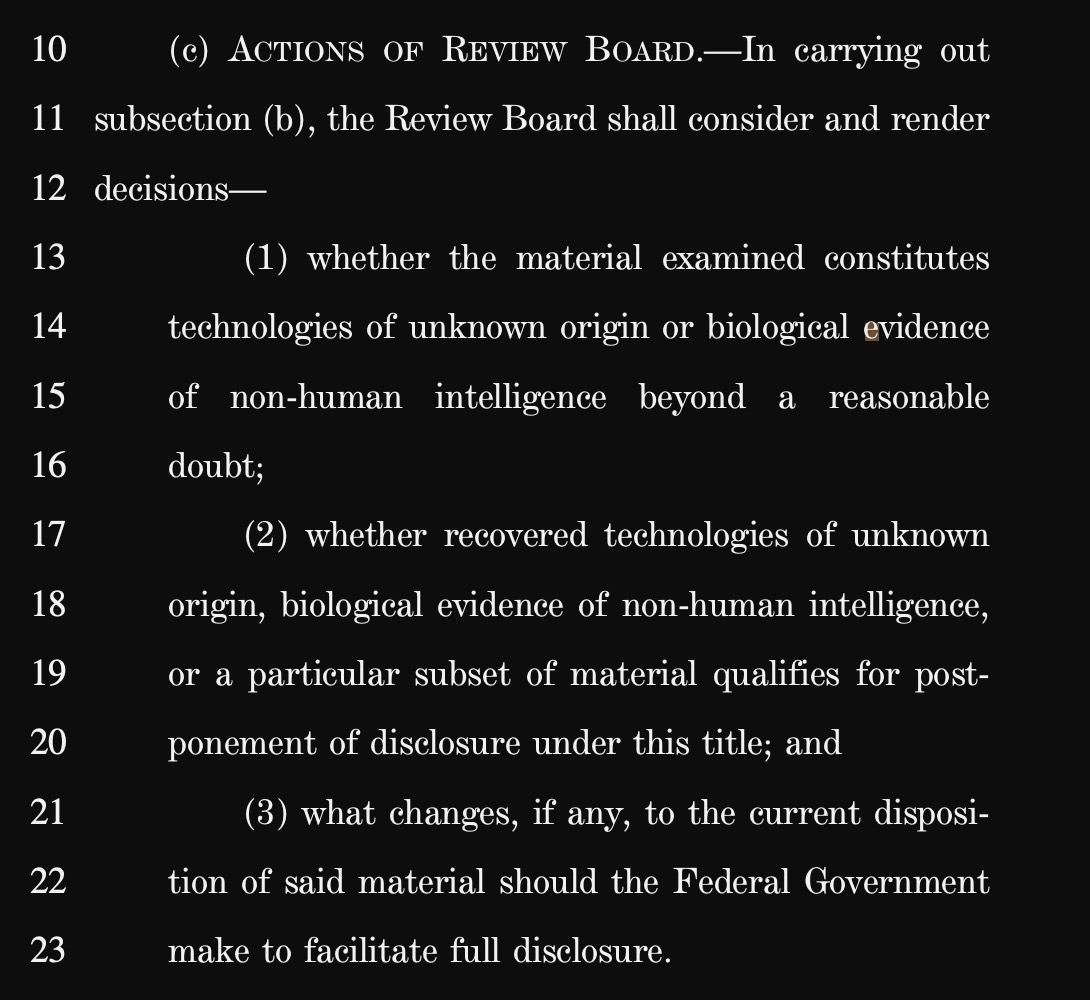
The bill goes on to note that it will be up to the review board to decide “beyond a reasonable doubt” if the material is “biological evidence of non-human intelligence” or “technologies of unknown origin.” Then they will need to decide if said items qualify for “postponement of disclosure” and “what changes, if any, to the current disposition of said material should the Federal Government make to facilitate full disclosure.”
Now that’s interesting. What possible changes to alien biological evidence or technology would the government need to make in order to allow the public to know about it?
This same section on disclosure then goes on to talk about how the review board will have access to all testimony and witnesses “within the Federal Government’s possession as of and after the date of the enactment of this Act…” It also notes they can solicit additional witnesses.
After the eminent domain section, in Section 11, the act allows the Review Board to get the Attorney General to request that courts release information relevant to UAPs that are “held under seal of the court.” It also mentions having the Secretary of State contact foreign governments with UAP technology and “seek disclosure.”
The Definition of ‘Technologies of Unknown Origin’ Includes Aerospace & Undersea Vehicles
Also fascinating is how the bill spells out what “technologies of unknown origin” include.
It notes on page 8 that this includes: “any materials or meta-materials, ejecta, crash debris, mechanisms, machinery, equipment, assemblies or sub-assemblies, engineering models or processes, damaged or intact aerospace vehicles, and damaged or intact ocean-surface and undersea craft associated with unidentified anomalous phenomena or incorporating science and technology that lacks prosaic attribution or known means of human manufacture.”
Eminent Domain Might Affect an Aerospace Company Trying to Sell a UFO
Post Apocalyptic Media reported that journalist Ross Coulthart, who interviewed David Grusch for NewsNation, said sources told him that an aerospace company was trying to “divest itself” of a UFO. Coulthart made the statement during an interview with the Good Trouble Show on June 29, 2023. At the time, he noted that an aerospace company that owned a UFO might not be legally obligated to the government in any way.
Coulthart said: “Think about the legal implications… If you’re an aerospace company and you’ve divested yourself of an object that you’ve had possession of for 60 or 70 years, are you then legally obliged to reveal that all this time, you’ve secretly been holding it?”
He added: “…Let’s just say these allegations are correct and a private aerospace company was gifted technology 50, 60, 70 years ago — and that technology is still in their possession and they’ve been spending billions of dollars trying to develop it. On what basis can the government assert any kind of property right? … Frankly if you’re an aerospace company and you were given this, there was no commercial contract signed between you and the government at the time — and I’m told there wasn’t — and if essentially all you’re doing is quietly accounting every now and then to some faceless general for what you’re up to and showing them the latest tests of the technology, on what legal basis can the state assert any kind of property right over that technology?”
Interestingly, this amendment — if passed — would bring clarity to that question, qualifying all of that technology for governmental eminent domain.
Some Are Concerned About the Eminent Domain Provision
Some people in the UAP community have expressed concern about the eminent domain provision in particular.
Brandon Fugal, owner of Skinwalker Ranch, said in a tweet in March 2024 that he never lobbied against the legislation, but he was concerned about it. In another message, he wrote: “I am not 100% comfortable with the proposed legislation. I have serious concerns. So should you, if you really cared about disclosure & truth. Did I call anyone, write anyone or actively engage regarding it? NO.”
I am obviously wanting the world to know & continue to be fully transparent. An eminent domain action could potentially compromise our efforts to present all of our findings & discoveries to the public.
I often feel like I’m one of the only people that really cares & is willing…
— Brandon Fugal (@BrandonFugal) February 29, 2024
On February 29, 2024, he wrote: “I am obviously wanting the world to know & continue to be fully transparent. An eminent domain action could potentially compromise our efforts to present all of our findings & discoveries to the public. I often feel like I’m one of the only people that really cares & is willing to put their reputation & resources on the line for disclosure.”
He later expanded, explaining that he did not reach out to anyone, but has grave concerns about the government suppressing information.
“For the record I never personally reached out to anyone or any official relative to the legislation, even though I have serious concerns relative to certain aspects,” he said. “You should be too, if you truly wish for disclosure. The USG has been suppressing certain things for a very long time, with stakeholders focused on continued suppression. It is disappointing how many people are quick to attack & criticize, without seeking any understanding.”
Stephanie Dwilson is a licensed attorney and has a master's in science in science and technology journalism. She's known for her thorough, accurate reporting and commitment to journalistic integrity in all her work. You can reach her at writerdube@gmail.com.
